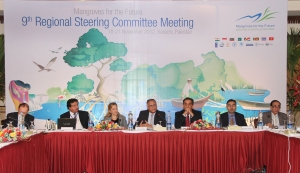Newsroom :: News :: 2012 :: MFF RSC pushing forward - 'Resilience, Climate Change and the Private Sector in Sustainable Coastal Management'.
MFF RSC pushing forward - 'Resilience, Climate Change and the Private Sector in Sustainable Coastal Management'.
Location: Karachi, Pakistan. 20th Nov 2012
Top coastal experts from Asia and representatives of private sector organizations from Karachi met in the RSC learning event to discuss the ever-increasing roles and responsibilities of the private sector and businesses towards protecting coastal areas and maintaining their ecological integrity.
This half-day event offered businesses a chance to gain knowledge on key coastal issues, innovative and effective approaches to managing associated risks and building brand value through partnership opportunities that contribute to sustainable development in coastal areas. It was an opportunity to share the best practices, experiences and lessons learnt and to gain insights on practical solutions and strategic approaches to CSR. The aim was to help companies effectively deal with sustainability challenges in coastal areas, especially as risks are exacerbated by the impacts of climate change.
With reference to climate change induced economic impacts in Pakistan, Malik Amin Aslam, Regional Councilor, IUCN said, “The costs of dealing with climate triggered impacts is going up, and according to assessments, could be in the range of US$ 6 to 14 billion per year for Pakistan. Climate triggered natural disasters have cost Pakistan’s economy 10 billion dollars in 2010 and 7 billion in 2011, pushing Pakistan into the list of countries severely impacted by climate change".
Javed Jabbar, former Vice President of IUCN commented, “The recent partnerships have demonstrated a growing business interest in biodiversity and have put forward an increasingly sophisticated business agenda on environmental sustainability and responsible resource use”.
The private sector is a major stakeholder in terms of coastal resource extraction and use in the form of food, oil and gas reserves, naval trade, and carbon storage. It is now becoming increasingly evident that business and private sector commitment towards safeguarding the coasts is vital. This is critical in the wake of recent climatic catastrophes the world has witnessed, where the scale of devastation was so huge that governments alone have found it challenging to mitigate the impacts.
Mangroves can play an important role in protecting billions of people living in coastal areas from disasters if managed effectively.
Leena Wokeck, Director, CSR Asia stressed, "It is important to emphasize that CSR and strategic investment in coastal ecosystems and communities are not the same thing as philanthropy, corporate charity, or being a caring company that gives back to society. CSR is not about the nice projects companies undertake with parts of the profits they make - it’s about how they make these profits in the first place. It’s about how they manage the environmental, social and economic impacts of every aspect of their operations, value chains, products and services".
Gulzar Firoz, Chairman Standing Committee on Environment, The Federation of Pakistan Chamber of Commerce and Industry speaking on the problem of waste disposal in coastal areas said, "The effluent that is being dumped on the coasts is ours, as is the responsibility to do all it takes to safe guard them. In Karachi, the public and private sector stepped up with help from the Dutch Government to set up an effluent treatment plant in 2007. This plant is treating affluent from 120 Tanneries in Korangi Industrial Industry, sector 7A. It is a rare example of a successful partnership. We are in dire need of more examples like this."
Today, MFF focuses on building resilient communities, which in turn translates to resilient coastal ecosystems. This involves protecting coastal zones from erosion and other threats associated with the impact of climate change. The strategic interest of business in MFF’s goals is most closely aligned in the tourism and fisheries sectors, but also includes the Oil and Gas sector, extractive industries operating in coastal areas, ports and harbors, as well as operators and investors in other infrastructure in coastal areas.


